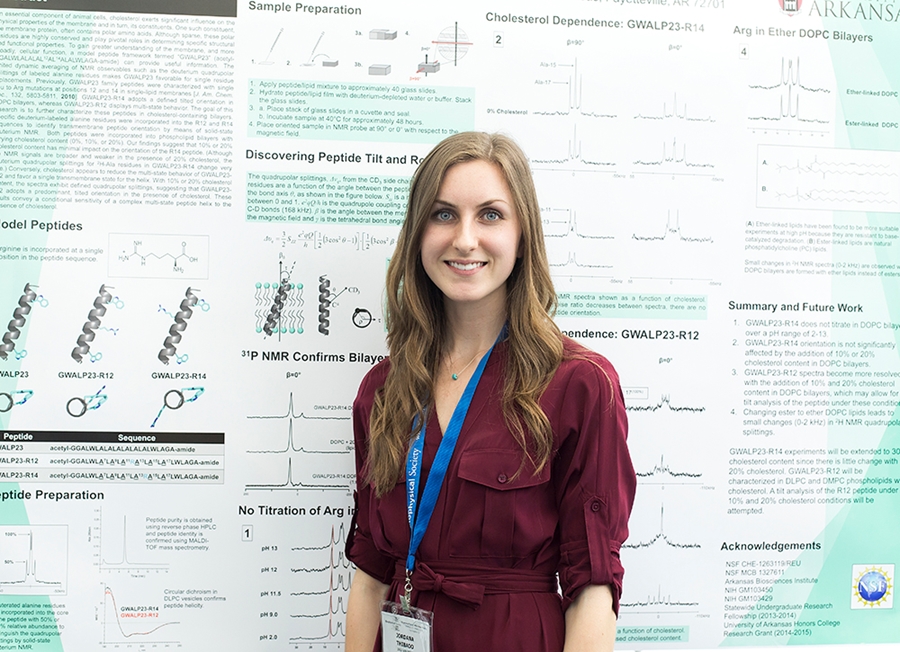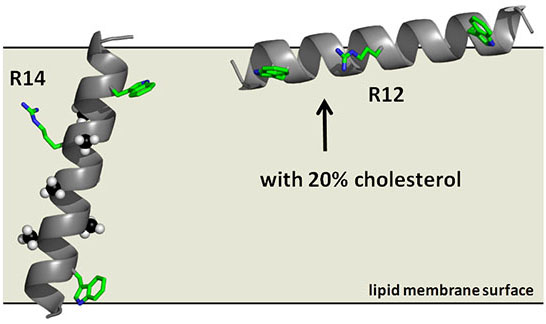
FAYETTEVILLE, Ark. – Jordana Thibado's honors research in Roger Koeppe's lab began in her freshman year, and has paid off with her publication as first author in Biochemistry, one of the leading journals in its field.
Thibado's paper, "Influence of High pH and Cholesterol on Single Arginine-Containing Transmembrane Peptide Helices," shares two findings that contribute to the understanding of cell membrane properties, and in the long term, could inform treatment of neurodegenerative diseases.
Thibado is now pursuing a doctoral degree in physiology, biophysics and systems biology at Weill Medical College, Cornell University's medical campus in New York City. In addition to Koeppe, a Distinguished Professor of chemistry and biochemistry in the J. William Fulbright College of Arts and Sciences, coauthors include U of A doctoral student Ashley Martfeld and research associate professor Denise Greathouse.
 Thibado explored what happens when peptide helices that mimic protein components of cell membranes were exposed to cholesterol. She found that when the amino acid arginine was inserted at the center of the helix and exposed to cholesterol, the helix was driven out of the lipid membrane (see diagram). However, arginine inserted at another part of the helix had no change when exposed to cholesterol.
Thibado explored what happens when peptide helices that mimic protein components of cell membranes were exposed to cholesterol. She found that when the amino acid arginine was inserted at the center of the helix and exposed to cholesterol, the helix was driven out of the lipid membrane (see diagram). However, arginine inserted at another part of the helix had no change when exposed to cholesterol.
"The future challenge is to figure out why cholesterol has such a big effect on one of these samples, and not on the other, because we don't understand why this is happening," Koeppe said. "Cholesterol is much studied, but many of the fundamental properties still are not well understood."
Thibado also found an important difference in the way two similar amino acids respond to the lipid environment of the cell.
"This causes us to rethink the impact of mutations from lysine to arginine," Koeppe said. "A lysine to arginine mutation, or vice versa, could cause major disruption to biological function, in some cases."
Thibado earned her B.S. degree in chemistry with a minor in biology, magna cum laude, last spring. A graduate student friend tipped Thibado off to Koeppe's work during her freshman year at the U of A.
"I read up on his research, which impacts our understanding of nerve degeneration - that grabbed my interest," Thibado said. "Forming a model to understand the physics of transmembrane proteins is extremely important for understanding physiology that we rely on every millisecond. Down the line, this work could advance drug design for diseases like Alzheimer's and Parkinson's where protein aggregation can occur."
Upon completion of her doctorate, Thibado hopes to find a faculty position in biophysics or biochemistry and launch her own lab. Publishing research in Biochemistry will help her advance that goal: "It definitely felt great, especially after putting in four years of work, to see the research culminate in publication," she said.
Thibado presented her research at the 2015 and 2016 annual meetings of the Biophysical Society in Baltimore and Los Angeles. She won first place in the poster competition in chemistry and biochemistry at the Arkansas NIH INBRE Biomedical Research Conference, November 2015; first place in the oral presentation in chemistry and biochemistry at the 100th Annual Arkansas Academy of Science Conference, April 2016; and first place in the poster competition at the 76th Annual Physical Electronics Conference, June 2016. Her work was supported by a State Undergraduate Research Fellowship (SURF) and Honors College Research and Travel Grants.
Topics
Contacts
Roger E. Koeppe II, Distinguished Professor of Chemistry
J. William Fulbright College of Arts and Sciences
479-575-4976,
Kendall Curlee, director of communications
Honors College
479-575-2024,